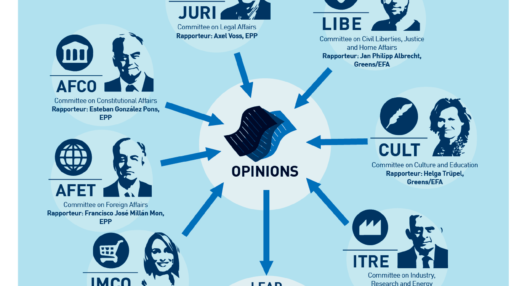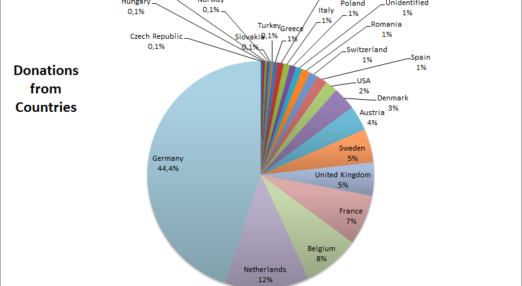Our work
EDRi is the biggest European network defending rights and freedoms online. We work to to challenge private and state actors who abuse their power to control or manipulate the public. We do so by advocating for robust and enforced laws, informing and mobilising people, promoting a healthy and accountable technology market, and building a movement of organisations and individuals committed to digital rights and freedoms in a connected world.
Filter resources
-

ENDitorial: Spanish rightsholders lobby against copyright reform
Among the very energetic but narrow group of critics attacking the European Parliament’s draft report on the implementation of the Information Society Directive (2014/2256(INI)), the Spanish collecting society SGAE has been one of the most vociferous. In a position paper sent to Parliamentarians, SGAE declares “inadmissible” the mere idea of debating copyright reform and makes […]
Read more
-

Scottish Government proposes a national ID database
The Scottish Government has run a consultation to use the National Health Service (NHS) Registry database as a means to connect citizens’ data and allow online logins. The proposal has similar characteristics to the plan to introduce an Identity Database in the United Kingdom which was abandoned in 2006. Campaigners and opposition parties have urged […]
Read more
-
EU Council proposals on open internet – Episode 2, the clown wars
After one year of negotiations, a second element of the telecoms regulation was also agreed by the EU Council: arbitrary, ad hoc law enforcement by internet companies. The Council has decided that this is something that internet companies may do, may not do and may do (Council text, pdf). When the European Commission proposed its […]
Read more
-
EU Council proposals on protecting the open internet – Episode 1, the phantom neutrality
After the European Parliament voted to protect net neutrality in April of last year, the EU Council of Ministers has just adopted its text on net neutrality (pdf)*. It claims to aim to defend the open internet, but would, in fact, permit every imaginable breach of net neutrality. The misleading nature of the adopted text […]
Read more
-

Leaked documents: European data protection reform is badly broken
Brussels, Belgium. New leaked documents show that European countries, pushed by Germany, are systematically working to destroy the fabric of European privacy legislation. Under the current proposals, far from being provided with security fit for the digital age, Europe’s citizens right to data protection would be devoid of meaning. The Regulation is becoming an empty […]
Read more
-

TTIP Resolution: document pool
The European Parliament is going to adopt a Resolution on TTIP. A resolution is a political statement which does not have binding effects. However, a strong resolution from the Parliament could be a step in the right direction. The Committee on International Trade (INTA) was in charge of the dossier and was guided by Opinions […]
Read more
-

Infographic: TTIP Resolution
The Transatlantic Trade and Investment Partnership (TTIP) is an agreement which is currently being negotiated between the United States and the European Union. The European Parliament is going to adopt a Resolution on TTIP. A resolution is a political statement which does not have binding effects. This infographic shows how it is going to be […]
Read more
-
So, whatever happened to net neutrality in Europe?
After all of the excitement and jubilation as a result of the US FCC’s ruling on net neutrality, what is going on in Europe? Quite a lot, as it happens. History In September 2013, the European Commission produced a badly drafted, incoherent “Telecoms Single Market Regulation”, which included proposals that claimed to support net neutrality, […]
Read more
-

Turkish academics threaten Twitter with legal action
On 20 January 2015, two Turkish law professors sent a legal notice to Twitter representatives in Turkey and the US demanding to cease the removal of content and blocking individual accounts that have been requested by Turkish government. The notice points out examples of alleged violations of freedom of expression in court orders restricting internet […]
Read more
-

Booklet: Activist Guide to the Brussels Maze updated
After the major changes in 2014 to the Brussels activist landscape – with the European Parliament elections in May and the new European Commission that took office towards the end of the year – EDRi's booklet "Activist Guide to the Brussels Maze" has been updated. The version 2.0 is now available on our website.
Read more
-

Report on our fundraising campaign
Thanks to everyone who contributed during our fundraising campaign to support us. It brought in 27 271 Euro from 336 donors in 22 countries. It has been our second and most successful campaign. Here are a few statistics: Total amount raised: 27 271 EUR Number of donations: 336 Number of fundraising days: 66 Donations from […]
Read more
-

UN report on copyright – is the EU really a beacon of human rights?
Copyright has seen a spectacular rise in importance, both politically and legally, in recent decades. The digitisation of cultural and scientific goods has led many rights holders to see strengthened copyright protection as the only means of ensuring the survival of the cultural industry. To a large extent the rights holders’ quest for more legal […]
Read more
